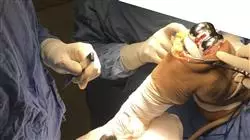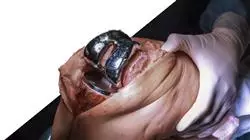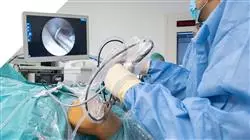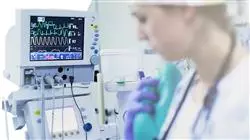University certificate
The world's largest faculty of medicine”
Why study at TECH?
You will develop the most useful epidemiological principles in Severe Traumatic Illness and update your professional practice”

Despite the fact that cardiopulmonary arrest kills around 45,000 people annually, some hospitals are not aware of new techniques for advanced monitoring of critically ill patients. This is extremely important, as the technology provides the opportunity to closely monitor vital functions as well as other physiological parameters in patients.
One of the most widely used new technologies is Transesophageal Echocardiography, which is used to produce images of the heart to appreciate its function. In this way, blood clots or infectious endocarditis can be detected and appropriate cardiac procedures can be planned.
In this context, TECH has implemented a program that will enable healthcare professionals to use the most advanced tools to treat cardiorespiratory arrest. Under the guidelines of a quality teaching staff, the syllabus will delve into the use of intra-PCR ultrasound diagnostic phase. Graduates will be able to effectively detect potentially reversible causes of cardiac origin.
Likewise, the different forms of electrical and hemodynamic monitoring will be addressed in order to verify the real situation of patients. In this sense, the didactic materials will analyze the benefits of Artificial Intelligence to detect early cases from the monitoring of users, knowing aspects such as heart rate, respiratory rate or blood pressure.
On the other hand, the only thing students will need is an electronic device with an Internet connection (such as a cell phone, computer or tablet) to access the teaching material. n this sense, the schedules and evaluation chronograms can be planned individually. In addition, it should be noted that the syllabus will be supported by the innovative Relearningteaching system, consisting of the reiteration of key concepts to ensure mastery of the contents. At the same time, it mixes the learning process with the study of real clinical cases, in order to acquire knowledge in a natural and progressive way, without the extra effort of memorizing.
Looking to delve into chest trauma monitoring procedures? Achieve it in only 450 hours!”
This Postgraduate diploma in Advanced Life Support in Severe Trauma contains the most complete and up-to-date scientific program on the market. The most important features include:
- Practice cases presented by experts in Advanced Life Support and Monitoring in the Critically Ill Patient
- The graphic, schematic and practical contents with which it is conceived scientific and practical information on those disciplines that are essential for professional practice
- Practical exercises where the self-assessment process can be carried out to improve learning
- Its special emphasis on innovative methodologies
- Theoretical lessons, questions to the expert, debate forums on controversial topics, and individual reflection assignments
- Content that is accessible from any fixed or portable device with an Internet connection
This program will give you the opportunity to update your knowledge with the maximum scientific rigor from an institution at the forefront of technology”
The program's teaching staff includes professionals from the sector who bring to this program the experience of their work, in addition to recognized specialists from prestigious reference societies and universities.
The multimedia content, developed with the latest educational technology, will provide the professional with situated and contextual learning, i.e., a simulated environment that will provide immersive education programmed to learn in real situations.
This program is designed around Problem-Based Learning, whereby the professional must try to solve the different professional practice situations that arise during the academic year For this purpose, the students will be assisted by an innovative interactive video system created by renowned and experienced experts.
You will analyze in detail the particularities of the FEER Protocol in 5 months"

You will have access to a learning system based on repetition, with natural and progressive teaching throughout the entire syllabus"
Syllabus
This program will delve into the conceptual aspects that have conditioned the definition of Severe Traumatic Illness. In this line, the syllabus will analyze in detail the techniques for the therapeutic control of Traumatic Brain Injury (TBI) and their respective monitoring systems. Likewise, the program will deal with the importance of diagnostic tests through images, among which Ultrasound stands out, to know the state of the patients. In this way, the most innovative technology in the healthcare market will be offered, so that students can apply it to their procedures immediately.

Thanks to the Relearning system, you will integrate the concepts in a natural and progressive way. Forget about memorizing!”
Module 1. Advanced Life Support in the Severe Trauma Patient
1.1. Severe Traumatic Illness in the 21st Century
1.1.1. Severe Traumatic Illness
1.1.2. Pathophysiology of Severe Traumatic Illness
1.1.3. Epidemiology and Outcomes
}1.2. Biomechanics
1.2.1. Biomechanics
1.2.2. Analysis of the Impact of Biomechanics in Severe Trauma Care
1.2.3. Biomechanical Analysis of Special Traumas
1.3. Therapeutic Management of Severe Traumatic Brain Injury (TBI)
1.3.1. Severe TBI
1.3.2. Diagnostic and Monitoring Systems
1.3.3. Therapeutic Control
1.4. Monitoring of Spinal / Spinal Cord Trauma
1.4.1. Spinal Cord TBI
1.4.2. Diagnostic and Monitoring Systems
1.4.3. Therapeutic Control
1.5. Thoracic Trauma Monitoring
1.5.1. Thoracic Trauma
1.5.2. Diagnostic and Monitoring Systems
1.5.3. Therapeutic Control
1.6. Abdominal Trauma Monitoring
1.6.1. Abdominal Trauma
1.6.2. Diagnostic and Monitoring Systems
1.6.3. Therapeutic Control
1.7. Pelvic and Orthopedic Trauma Monitoring
1.7.1. Pelvic and Orthopedic Trauma
1.7.2. Diagnostic and Monitoring Systems
1.7.3. Therapeutic Control
1.8. Monitoring and Care of Severe Trauma in Special Situations
1.8.1. Severe Trauma Care in Special Situations
1.8.2. Diagnostic and Monitoring Systems
1.8.3. Therapeutic Control
1.9. Monitoring of Severe Thermal Trauma
1.9.1. Severe Thermal Trauma
1.9.2. Diagnostic and Monitoring Systems
1.9.3. Therapeutic Control
1.10. Monitoring of Analgosedation
1.10.1. Analgesedation
1.10.2. Sedation and Analgesia. BNM ( Neuromuscular Block)
1.10.3. Monitoring
Module 2. Imaging Technology in Cardiorespiratory Arrest (CRA)
2.1. Indications of Ultrasound Study in CRP
2.1.1. Epidemiology
2.1.2. Echocardiography
2.1.3. Pulmonary Ultrasound
2.2. Use of Intra CRP Ultrasound: Diagnostic Phase
2.2.1. Differential Diagnosis
2.2.2. Diagnosis of Potentially Reversible Causes of Cardiac Origin
2.2.3. Diagnosis of Pseudo-ESPA
2.3. Use of Intra CRP Ultrasound: Advanced Diagnostic Phase
2.3.1. Diagnosis of Potentially Reversible Causes of Non-Cardiac Origin
2.3.2. Assessment of the Normal Position of the TOT
2.3.3. Assessment of Recovery of Spontaneous Circulation
2.4. FEER Protocol (Focused Echocardiographic Evaluation in Resuscitation). Preparation Phase
2.4.1. CPR and Preparation of the Equipment
2.4.2. Execution and Imaging
2.4.3. Resumption of CPR
2.5. FEER Protocol (Focused Echocardiographic Evaluation in Resuscitation) 2. Evaluation Phase
2.5.1. Interpretation and Communication
2.5.2. Determination of Underlying Causes
2.5.3. Verification of Correct Intubation
2.6. FEER Protocol (Focused Echocardiographic Evaluation in Resuscitation) 3. Implementation Phase
2.6.1. Decision-Making Algorithms
2.6.2. Ultrasound in the Development of Life Support
2.6.3. Advanced Diagnostic and Therapeutic Processes
2.7. FEER Protocol (Focused Echocardiographic Evaluation in Resuscitation) 4. Resuscitation Phase or Prognostic Phase
2.7.1. Post CPR Care
2.7.2. Resuscitation
2.7.3. Prognostic Study
2.8. Other Protocols
2.8.1. FEEL
2.8.2. CAUSE
2.8.3. E-FAST
2.8.4. RUSH
2.8.5. BLUE
2.9. Education and Training
2.9.1. Training Criteria
2.9.2. Protocols
2.9.3. Simulation
2.10. Use of Transesophageal Echocardiography in CPR
2.10.1. Differential Elements with Transthoracic Echocardiography
2.10.2. Indications
2.10.3. Technique
Module 3. Advanced Monitoring in the Critical Patient
3.1. Monitoring in the Critically Ill Patient
3.1.1. Epidemiology: Impact of Monitoring on the Prognosis of the Critically Ill Patient
3.1.2. Physiological Basis
3.1.3. Pathophysiological Bases
3.2. Neuromonitoring
3.2.1. Indications
3.2.2. Neuromonitoring Systems
3.2.3. Multimodal Neuromonitoring
3.3. Electrical and Hemodynamic Monitoring
3.3.1. Indications for Monitoring
3.3.2. Electrical Monitoring Systems
3.3.3. Hemodynamic Monitoring Systems
3.4. Electrical and Hemodynamic Monitoring. Advanced and Personalized Monitoring: Precision Monitoring
3.4.1. Indications for Advanced and Personalized Monitoring
3.4.2. Advanced Electrical Monitoring Systems
3.4.3. Advanced Hemodynamic Monitoring Systems
3.5. Monitoring of Gaseous Exchange and Ventilatory Mechanics
3.5.1. Indications
3.5.2. Respiratory Monitoring Systems
3.5.3. Ventilatory Mechanics Monitoring Systems
3.6. Renal Function Monitoring
3.6.1. Indications
3.6.1. Renal Function Monitoring Systems
3.6.3. Monitoring of Renal Function in the Patient Subjected to Continuous Extrarenal Clearance Techniques
3.7. Tissue Perfusion Monitoring
3.7.1. Indications
3.7.2. Tissue Perfusion Monitoring Systems
3.7.3. Evaluation of the Available Scientific Evidence and Its Use in Clinical Practice
3.8. Sedation Monitoring
3.8.1. Indications
3.8.2. Sedation and Analgesia Monitoring Systems
3.8.3. Computerized Systems vs. Prediction Scales
3.9. Multimodal Monitoring
3.9.1. Applications
3.9.2. Prediction Systems
3.9.3. Pathophysiological and Technological Bases
3.10. Artificial Intelligence and Monitoring: Precision Monitoring and Prediction
3.10.1. Applications
3.10.2. Prediction Systems
3.10.3. Pathophysiological and Technological Bases

You will learn through real cases and by solving complex situations in simulated learning environments”
Postgraduate Diploma in Advanced Life Support in Severe Trauma
Advanced life support in severe trauma (SVATG) is a vital specialty in the medical care of patients who have suffered severe injuries or trauma. TECH Global University presents the Postgraduate Diploma in Advanced Life Support in Severe Trauma, with the objective of providing advanced knowledge and specialized skills so that professionals manage to face severe trauma situations with confidence and competence. Through this program, delivered online, you will begin your learning by exploring the essential fundamentals of life support in severe trauma. This module establishes the basis for understanding the particularities of trauma, the initial patient assessment and the necessary critical interventions. You will also learn advanced techniques for the management of traumatic injuries. This module focuses on the identification and specialized treatment of injuries, from fractures to internal organ injuries, ensuring a rapid and effective response.
Learn everything you need to know about traumatic injuries.
Learn all about advanced life support in severe trauma
Only at TECH will you find the most up-to-date methods in the industry, complemented with multimedia material and dynamic classes. Here, we employ innovative methodologies, classes supported by multimedia material and Relearning teaching models that together will achieve a dynamic and efficient educational process. During the course of the program, you will have access to the best content related to this healthcare field. As you progress, you will explore advanced life support procedures specific to severe trauma situations. From intubation to hemodynamic stabilization, this module provides crucial practical skills for the effective management of trauma patients. Upon completion of this Postgraduate Certificate, you will become an advanced life support specialist in severe trauma, ready to meet critical challenges with competence and determination. Join us and make a difference in trauma emergency care - enroll now and hone your skills in the management of severe trauma!







